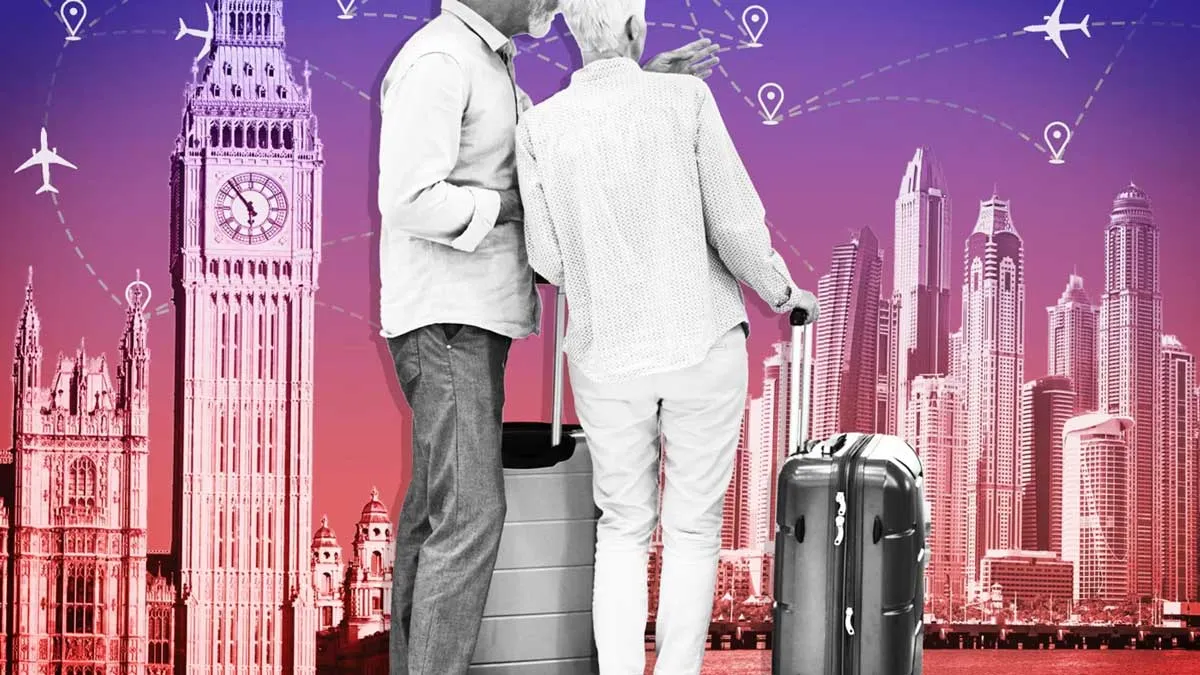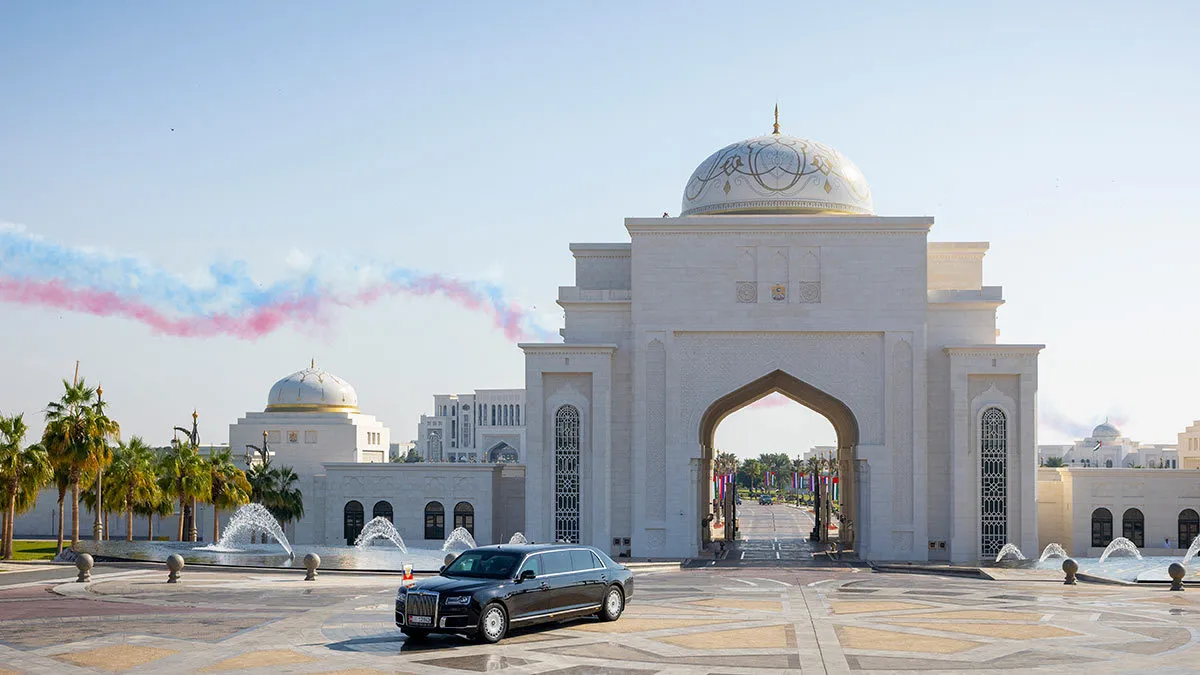The UAE is one of the most welcoming countries for Britons looking to trade the charm of rural life for the luxury of urban living. With modern architecture, advanced infrastructure, a vast range of entertainment and educational options, cutting-edge technology, high levels of service, and no personal income tax, it’s an undeniably attractive destination.
However, it’s essential to prepare carefully to avoid various legal and financial challenges. You’ll need to budget for living expenses, consider cultural differences, and understand the legal requirements. This guide provides a comprehensive overview to help you start your move to the UAE from the UK.
Pros and сons of moving to the UAE
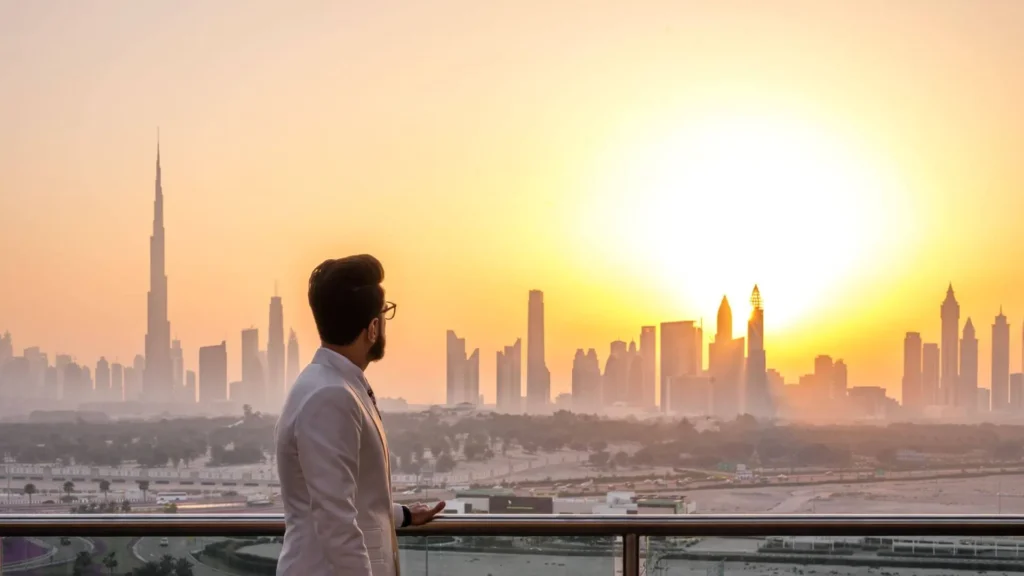
Let’s start by examining the key differences between the countries. Here are some main advantages of relocating from the UK to the UAE:
- Tax benefits. The UAE has no personal income tax, which is a significant advantage for expats looking to save.
- High standard of living. Modern infrastructure, high-quality healthcare services, and excellent safety make the UAE a desirable place to live. Crime rates in Dubai are significantly lower than in the UK due to strict laws.
- International environment. The UAE is a multicultural country where you’ll meet people from all over the world. This fosters valuable business and academic connections.
- Economic opportunities. The rapidly growing economy attracts entrepreneurs and professionals from diverse sectors. Skilled specialists who find work in their fields can expect a comfortable lifestyle.
- Climate. Year-round sunshine may appeal to those weary of the UK’s rainy weather.
There are, however, some disadvantages to life in the UAE to consider:
- Heat. Summer temperatures often exceed 40°C, which can be challenging for those not accustomed to extreme heat. Although air conditioning provides relief.
- Cultural differences. Although it’s an international environment, UAE laws and norms can differ significantly from Western standards, requiring some adjustment time.
- Cost of living. While there’s no income tax, the cost of housing, healthcare, and education can be high, especially in cities like Dubai and Abu Dhabi.
- Restrictions on alcohol and cultural norms. Some emirates have strict laws on alcohol consumption, allowing it only in designated areas, which might surprise new residents. Dress codes should be respected – avoid overly revealing attire; public displays of affection (kissing, hugging) should also be minimized. For Britons, it’s also important to note that same-sex relationships are criminalized in the UAE..
- Citizenship limitations. Unlike in the UK, obtaining UAE citizenship is not possible. Expats generally remain permanent residents.
Given that over 300,000 UK citizens have already relocated to the UAE, it’s clear that these drawbacks don’t deter everyone.
Healthcare

The UAE has modern, world-class medical facilities. Highly qualified specialists are available in both public and private clinics. However, public healthcare services are primarily for UAE citizens, and most expats are referred to private clinics. Expats are required to have health insurance, which is often covered by their employers. This insurance generally covers essential costs for paid medical services.
Key differences in healthcare between the UAE and the UK:
- Accessibility. Healthcare is free in the UK through the NHS, while in the UAE, expats must have insurance to access medical services.
- Quality of services. Both countries provide high-quality healthcare, but private healthcare in the UAE is often faster and more accessible than the NHS in the UK. A common issue in the UK healthcare system is long wait times to see specialists and a lack of resources in some areas, frequently drawing criticism.
- Cost. In the UK, healthcare costs are covered through the tax system, while in the UAE, private services can be expensive without insurance.
Financial comparison: the UK vs the UAE
To understand the cost of living in the UAE, let’s compare expenses and average income levels for those who may find work as professionals upon arrival. It’s worth noting that British qualifications are highly regarded in the UAE.
| Criteria | UK | UAE |
|---|---|---|
| Cost of living | High, especially in London and major cities. Example rental costs: – London: £1,500–2,500/month (~$1,950–3,240). – Other cities: £800–1,500/month (~$1,030–1,950). Food (especially meat and milk), utilities, gas, and services are also expensive: – 1 liter of milk: £1.00 (~$1.20) – Bread (500g): £1.10 (~$1.30) – 1 kg of chicken fillet: £6.50 (~$7.90). | High in major cities (Dubai, Abu Dhabi), particularly for housing: – Dubai: 6,000–12,000 AED/month (~$1,630–3,200). – Other emirates: 4,000–8,000 AED/month (~$1,090–2,450). Food, transportation, and utilities are also costly, but gas prices are low. – 1 liter of milk: 6.50 AED (~$1.80). – Bread (500g): 5.50 AED (~$1.50). – 1 kg of chicken fillet: 25.00 AED (~$6.80). |
| Taxes | – Income tax up to 45% for high earners. – Property tax and other forms of ownership tax. – VAT: 20% | – No income tax for individuals. – Corporate tax from 2023: 9% for businesses. – VAT: 5% |
| Salaries | Average salary varies by industry: – £25,000–35,000 annually (~$32,420–45,390) for most professions. High salaries in finance and IT. | Salaries are higher than in many countries: – 180,000–300,000 AED annually (~$49,000–81,670) for most professions. Higher salaries in sectors like oil and gas, finance, and IT. |
| Social benefits | – Free healthcare through the NHS. – Social benefits for the unemployed, housing assistance, and pensions. | – Employers provide health insurance. – Pension and social benefits for expats are limited. |
| Transport costs | High transport costs, especially in London: – Annual travel pass: £1,200 (~$1,560). – Gasoline: £1.60 per liter (~$2). | Public transport is well-developed in major cities, but most people prefer cars: – Gasoline: 3.00 AED per liter (~$0.80) |
Key points to consider when evaluating a move to Dubai or other emirates:
- Taxes. The UAE has no personal income tax, while taxes in the UK take a substantial portion of income.
- Salaries. Salaries in certain sectors in the UAE, especially in finance and technology, are higher than in the UK, attracting professionals.
- Cost of living. Both countries have a high cost of living, especially in big cities. However, housing and transport expenses in the UAE can be lower due to low fuel prices.
Steps to start moving from the UK to Dubai
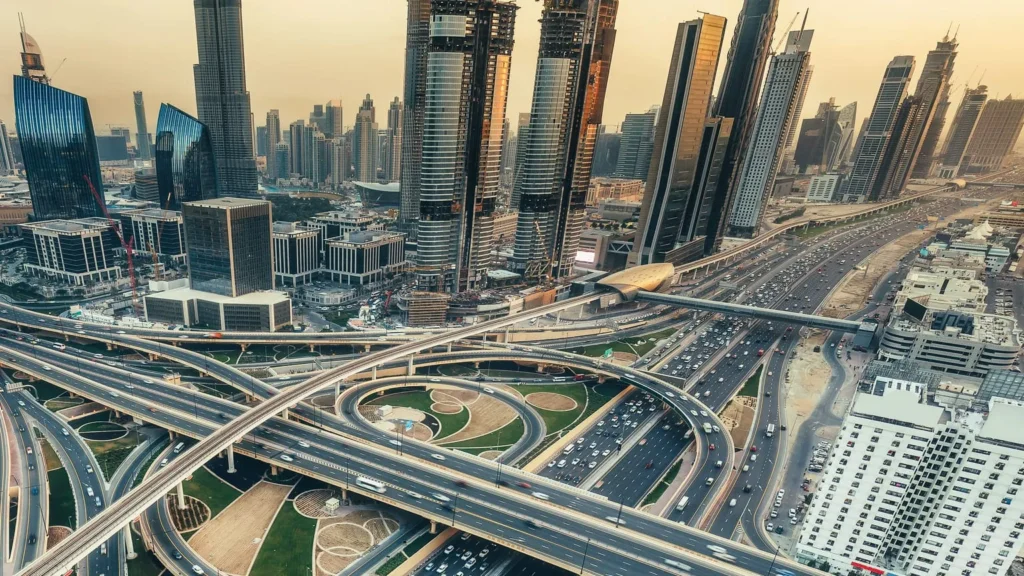
You cannot stay in the UAE without a visa. You will need a residence visa to live in Dubai (or another emirate) and to be eligible to work or conduct business. Technically, you can apply for it online, thanks to modern technology. However, some formalities still require a tourist visa. For instance, obtaining a residence visa requires a medical examination.
Getting a visa for the UAE
If you find the lifestyle in the UAE appealing, the first step is to obtain a tourist visa. This allows you to stay in the country for up to 60 days. You can extend it for additional 30 days. This gives tourists a maximum stay of 90 consecutive days in the UAE. During this time, you can manage most formalities, including securing employment or starting a business to qualify for long-term residency.
To obtain a tourist visa, you’ll need to gather all necessary documents and submit your application to Immigration Services at least two weeks before your trip:
- Passport – valid for at least six months from your entry date.
- Visa application – completed online or through an agency, such as our company.
- Photo – a color photo with a white background, sized 43 × 55 mm.
- Proof of accommodation – hotel booking or an invitation from a UAE resident.
The visa process can be completed online. Additionally, it’s advisable to prepare any educational documents needed for subsequent steps.
Applying for a residence visa
A residence visa valid from two to ten years can be granted for:
- employment – in this case, a sponsored visa is typically covered by the employer;
- enrollment in a local university;
- starting a business – the visa is issued to the founder of a company, branch, or representative office;
- real estate purchase – for properties worth at least 750,000 AED;
- investment – includes bank deposits, stock market investments, or investments in local businesses.
Moving to Dubai without a job is possible only if you qualify as a “businessperson,” “investor,” or “dependent” (such as a relative, spouse, or domestic worker of a sponsor with a Golden Visa). However, securing a job from the UK in Dubai can be advantageous since highly skilled professionals are valued. They often receive competitive salaries.
The duration, cost, and requirements for obtaining a residence visa depend on various factors:
| Category | Visa duration | Documents required | Approximate cost and processing time |
|---|---|---|---|
| Employees | 1–2 years (renewable based on contract) | – Employment contract – passport – medical insurance – medical test – photo | ~3 000–7 000 AED ($820–1 900) ~2 weeks |
| Students | 1 year (renewable) | – enrollment letter – passport – photo – proof of funds | ~ 2 500–3 500 AED ($680–950) ~2 weeks |
| Business owners | 2 years | – business license – proof of financial stability – passport – photo | ~ 4 000–10 000 AED ($1 100–2 700) 2 weeks to 1.5 months, depending on various factors |
| Property investors | 2–10 years (depending on investment) | – property documents – passport – medical insurance – photo | ~ 7 000–15 000 AED ($1 900–4 100) 2 weeks to 1.5 months, depending on various factors |
Important considerations:
- Costs and processing times vary based on visa type and emirate.
- All residence visa categories require a medical test and insurance.
- Retirees may also qualify for a residence visa if sponsored by a family member with a Golden Visa or by investing in property worth at least 1 million AED.
If you apply for a residence visa through our service, we will advise you on the best time to arrive in the UAE to avoid unnecessary expenses. We also offer “turnkey” services to expedite visas for investors and business owners, including:
- selecting a property and evaluating its market value.
- opening a bank account (personal or corporate).
- assisting with property purchases and preparing documentation.
- registering a business and obtaining necessary permits.
You can start by consulting us to find the best location for investments and business setup. “Free zones” in Dubai are particularly popular with foreign investors due to the range of opportunities available. However, they have specific regulations. Our services provide full legal and financial support to help you navigate these areas effectively.
Legal visa renewal
A tourist visa can legally be renewed in only one way: by leaving the country temporarily. For residence visa renewal, you’ll need to confirm that:
- you are still studying or employed;
- you remain the owner of your property;
- your business is still actively operating;
- your investments remain intact.
In this way, visas can be renewed an unlimited number of times.
Finding housing — renting or buying?

Living in a hotel permanently can be costly. So, you’ll need to arrange housing upon arrival.
Here’s a comparison of renting versus buying property in Dubai for expats.
| Criteria | Renting property | Buying property |
|---|---|---|
| Pros | – Lower initial costs – Flexibility to move – No need for large deposits or loans | – Long-term investment – Eligibility for residence visa (for purchases over AED 750,000) – Dubai real estate values are consistently rising |
| Cons | – No ownership rights – Dependence on landlord (e.g., rent increases, contract changes) | – High upfront costs – Purchase commissions, taxes, and additional maintenance costs |
| Cost | – Dubai: 1-bedroom apartment rental: 6,000–12,000 AED/month ($1,630–$3,270) – Abu Dhabi: 5,000–10,000 AED/month ($1,360–$2,720) | – 1-bedroom apartment: 1–1.5 million AED ($270 000–410 000) – Villa: 2.5–5 million AED ($680,000–$1.36 million) |
| Terms | Rental contracts are typically for 1 year, renewable | – Requires a down payment (usually 20%) – Long-term mortgage options for residents and non-residents |
| Influencing factors | – Location, property condition, lease duration – Market demand | – Location, property type, buyer’s status – Investment amount and purpose (personal use or rental) |
Renting is often more suitable for those seeking flexibility or not yet ready for significant investment. However, buying property offers a path to a residence visa, which remains valid even if you lose your job.
Living in the UAE: what to expect
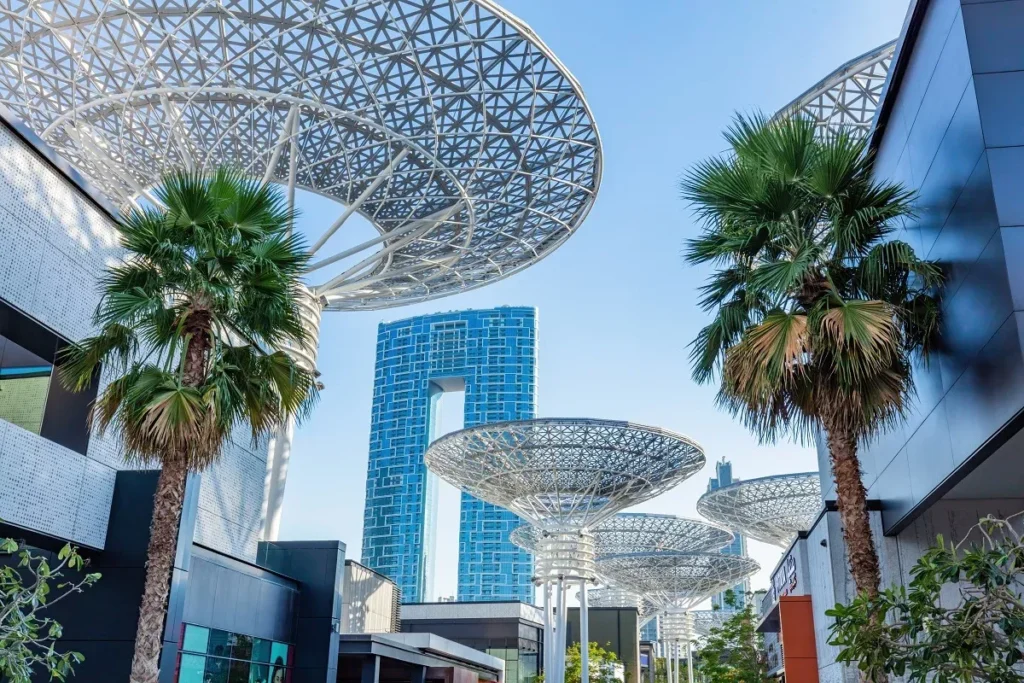
Monthly living in Dubai
Here’s a comparison of key living costs in Dubai and London, including housing, transportation, food, entertainment, healthcare, and children’s education.
| Category | Dubai | London |
|---|---|---|
| Housing (rent) | – 1-bedroom in the city center: 6,000–12,000 AED/month ($1,630–$3,270) – Outside center: 4,000–7,000 AED/month ($1,090–$1,910) | – 1-bedroom in the city center: £1,500–£2,500/month ($1,820–$3,040) – Outside center: £1,000–£1,500/month ($1,210–$1,820) |
| Transportation | – Monthly pass: 300 AED ($82) – Petrol: 3.00 AED/liter ($0.80) | – Monthly pass: £150 ($180) – Petrol: £1.60/liter ($2.00) |
| Food | – Dinner at a mid-range restaurant: 200 AED ($55) – Monthly groceries (1 person): 1 000–1 500 AED ($270–410) | – Dinner at a mid-range restaurant: £60 ($73) – Monthly groceries (1 person): £250–£350 ($300–$430) |
| Entertainment | – Cinema ticket: 45 AED ($12) – Gym membership: 250–400 AED/month ($68–$110) | – Cinema ticket: £15 ($18) – Gym membership: £50–£80/month ($60–$100) |
| Healthcare | – Private insurance: 5,000–10,000 AED/year ($1,360–$2,720) – Doctor consultation: 200 AED ($55) | – Private insurance: £1,000–£1,500/year ($1,210–$1,820) – NHS is free, but private visits can cost £100 ($120) |
| Children’s education | International schools: 30,000–80,000 AED/year (~$8 170–21 800) | Private schools: £25,000–£40,000/year (~$32 630–51940) |
Looking at these figures, moving to Dubai with a family may not drastically change your lifestyle, especially if you’re securing employment or opening a business. Here’s a breakdown:
- Rent in Dubai, particularly outside the center, can be more affordable than in London.
- Public transport in London is more expensive, while Dubai has cheaper fuel costs.
- Expats in Dubai may find Food and entertainment costs are comparable between the two capitals, with a slight cost advantage in dining costs in London.
- Expats in Dubai may find healthcare more costly due to private insurance requirements.
- International school fees in Dubai are generally lower than private school fees in London.
This comparison offers insight into areas where you might save or where expenses may be higher.
Quality of education
The quality of education in Dubai and London differ in approach and accessibility. London is home to numerous prestigious private and state schools with long-standing histories and high academic standards, including institutions that prepare students for world-class universities. In Dubai, the education system is geared toward international standards, offering a wide range of international schools, including British, American, and IB programs.
While schools in Dubai are considered high-quality, especially in the international segment, it’s challenging to compete with the long history and tradition of British educational institutions. Nonetheless, Dubai’s schools provide a strong multicultural environment, which is particularly attractive for expats.
Healthcare system

Expats in Dubai primarily use private clinics, the most prominent of which is the extensive Dubai London Clinic, network, offering services ranging from routine check-ups to specialized healthcare. Access to healthcare services in Dubai is generally easier and more straightforward than in the UK. Moreover, the quality of care is quite high, thanks to modern equipment and the recruitment of top specialists from around the world.
Work and business opportunities
British professionals are highly valued in the UAE due to the high-quality education in the UK and the lack of a language barrier (English is widely used alongside Arabic). The UAE job market offers many opportunities for expats in sectors like finance, technology, engineering, healthcare, construction, and tourism. If you’re considering starting a business or private practice, these fields may be worth exploring.
Cultural considerations
Although English is widely spoken, learning a few common Arabic phrases can aid social integration and is seen as a gesture of politeness and respect for the local culture. It’s also important to understand that the UAE is a Muslim country with a strong respect for religious practices. For example, during the holy month of Ramadan, observant Muslims abstain from food, drink, smoking, and other needs during daylight hours. While visitors are not expected to fast, it’s polite to eat and drink discreetly out of respect.
Additionally, be mindful of attitudes toward pork and alcohol. Both can be consumed in specific licensed establishments or at home. Appearing in public while intoxicated is prohibited. Familiarizing yourself with these and other local traditions can help avoid misunderstandings with clients or employers.
Emigration options
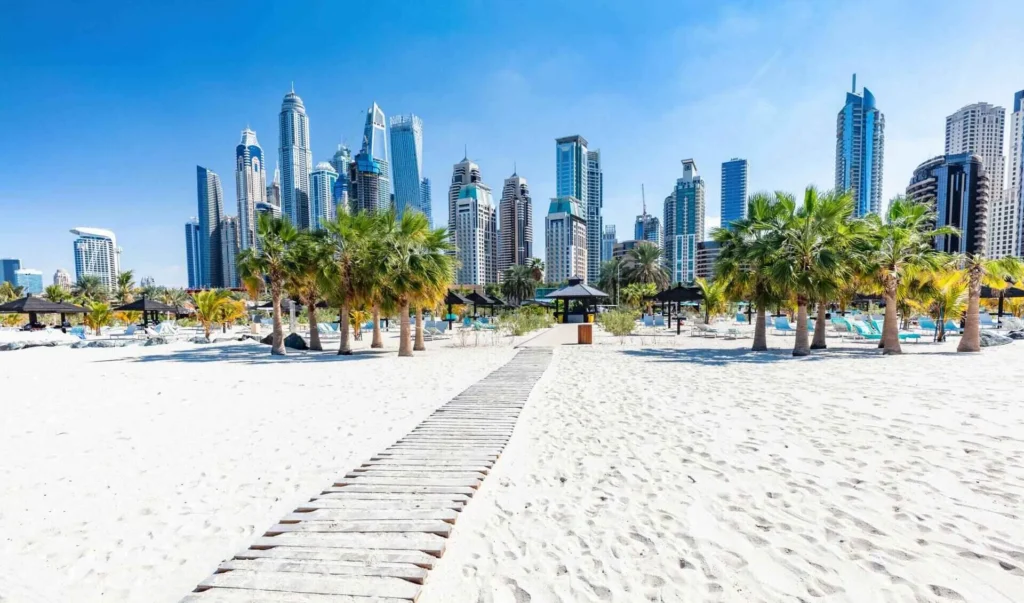
Emigrating to Dubai from the UK can be done through several pathways. As outlined in the section on obtaining a residency visa, the main options are:
- Study. You can obtain a student visa by enrolling in a university or college. The UAE highly values individuals with notable achievements in arts and sciences. Such individuals may qualify for a Golden Visa, which functions similarly to a residence permit.
- Work. You can secure a work visa through an employment contract with a local company.
- Business. Starting a business or purchasing an existing business allows for eligibility for a residency visa.
- Investment. Buying property worth at least AED 750,000 grants you a residency visa. Investing AED 2 million or more qualifies you for a 10-year Golden Visa. There are other investment options — such as funds, bank deposits, or businesses, with the visa type depending on the investment amount.
Each of these routes offers different opportunities for long-term residency and activity in the UAE. We recommend consulting with our specialists, who can help determine the best relocation option for you, including finding the ideal area to live based on your income.
For instance, if you plan to relocate to Abu Dhabi from the UK, it may be more costly and complex than moving to Dubai – Dubai has more real estate investment options if you’re interested in property ownership.
Financial management
Once you relocate to another country, it’s essential to monitor your income and expenses carefully. This approach will ensure you feel as comfortable in the UAE as you do at home. To receive salaries, business revenue, or investment income and to pay for goods and services, you’ll need a bank account. Until you obtain residency, banks may require proof of financial stability and fulfillment of other conditions.
Generally, to open a bank account in the UAE as a foreigner, including for UK citizens, the following requirements apply:
- Residency visa. A UAE residency visa is necessary to open a personal current account. Foreigners without residency can open only a savings account but with certain limitations.
- Documents:
- Passport and visa
- Proof of residence: such as a rental contract or property ownership document in the UAE.
- Proof of income: employment contract, income certificate, or business documents for entrepreneurs.
- Minimum balance. Some banks require a minimum balance (around AED 3,000–5,000 or approximately $820–1,360). Opening a corporate business account may require a larger deposit.
These conditions can vary depending on the bank and type of account (personal, corporate, or investment). We can assist in selecting a bank and smoothly navigating the account opening process.
Costs of moving to Dubai

If you’re planning to relocate with all your belongings, you’ll need to enlist the services of specialized international shipping companies. They offer two main options:
- full container load – your belongings are shipped in a private, sealed container;
- partial container load – your belongings are shipped in a shared container with items from other customers.
The choice of shipping method will impact the cost. It averages around £2,500. Additionally, packing services are available, although they come with an extra charge.
How to simplify moving from the UK to Dubai
This article has provided insight into the key aspects of life in the UAE as an expat, compared the cost of living between Dubai and London, and detailed the financial requirements for moving to Dubai. The remaining steps involve securing housing, employment, or an investment property, preparing the necessary documents, and navigating through various authorities. Naturally, this can be a time-consuming and complex process. You need to know how to fill out applications, which documents are required, and which offices to visit and when.
Moving to the UAE can be much simpler with the help of a company that offers “turnkey” relocation services. Dynasty Business Adviser, as a licensed agent, handles a wide range of immigration-related tasks. Our team includes financial advisors, lawyers, and notaries who assist at every stage, providing comprehensive services, including:
- Visa arrangements: tourist, residency, and Golden Visas.
- Housing or office selection for purchase or rent.
- Business registration and bank account setup.
- Investment program consultations.
- Document preparation, notarization, and verification.
Keep in mind that most of these tasks can be completed online, saving you both time and money. Reach out to us, and we’ll help you prepare all the necessary documents for your move as quickly as possible!


